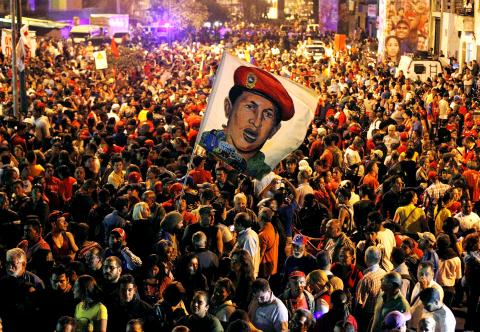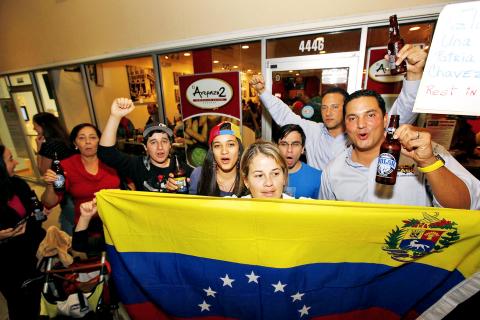Venezuelan President Hugo Chavez’s death has unleashed a flood of emotional tributes that his allies hope will help ensure the survival of his self-styled socialist revolution when voters elect a successor.
The 58-year-old died on Tuesday after a two-year battle with cancer that was first detected in his pelvis. He had suffered multiple complications following his latest operation on Dec. 11 last year and had not been seen in public since then.
Tens of thousands of Venezuelans immediately took to the streets to honor the flamboyant leader.

Photo: Reuters
The future of Chavez’s leftist policies, which won him the adoration of poor Venezuelans, but infuriated opponents, who denounced him as a dictator, now rests on the shoulders of Venezuelan Vice President Nicolas Maduro, the man he tapped to succeed him.
“In the immense pain of this historic tragedy that has affected our fatherland, we call on all the compatriots to be vigilant for peace, love, respect and tranquility,” he said.
Maduro, a 50-year-old former bus driver, will likely face opposition Miranda State Governor Henrique Capriles at the next election.

Photo: AFP
Venezuelan authorities said the vote would be called within 30 days, but it was not clear if that meant it would be held within 30 days or whether the date would be announced in that period.
One opinion poll gave Maduro a strong lead over Capriles, because he has received Chavez’s blessing as his heir apparent and is likely to benefit from the surge of emotion following the president’s death.
Some have suggested he could try to ease tensions with investors and the US, although, hours before Chavez’s death, Maduro alleged that “imperialist” enemies had infected the president with cancer as one of a number of conspiracies with domestic opponents.
A victory by Capriles would bring deep changes to Venezuela and would be welcomed by business groups and foreign investors.
“This is not the time to stress what separates us,” Capriles said in a statement on Tuesday night, calling for unity and respect for the loss that many felt after Chavez died.
“He was our father,” said Nancy Jotiya, 56. “He taught us to defend ourselves. Chavismo is not over.”
In Taipei, Ministry of Foreign Affairs deputy spokesperson Calvin Ho (何震寰) said Taipei offered its condolences to Venezuela.
Taiwan does not have diplomatic relationships with Venezuela, but had a representative office in the country from 1974 to 2009.
Additional reporting by Shih Hsiu-chuan

WAITING GAME: The US has so far only offered a ‘best rate tariff,’ which officials assume is about 15 percent, the same as Japan, a person familiar with the matter said Taiwan and the US have completed “technical consultations” regarding tariffs and a finalized rate is expected to be released soon, Executive Yuan spokeswoman Michelle Lee (李慧芝) told a news conference yesterday, as a 90-day pause on US President Donald Trump’s “reciprocal” tariffs is set to expire today. The two countries have reached a “certain degree of consensus” on issues such as tariffs, nontariff trade barriers, trade facilitation, supply chain resilience and economic security, Lee said. They also discussed opportunities for cooperation, investment and procurement, she said. A joint statement is still being negotiated and would be released once the US government has made

Authorities have detained three former Taiwan Semiconductor Manufacturing Co (TMSC, 台積電) employees on suspicion of compromising classified technology used in making 2-nanometer chips, the Taiwan High Prosecutors’ Office said yesterday. Prosecutors are holding a former TSMC engineer surnamed Chen (陳) and two recently sacked TSMC engineers, including one person surnamed Wu (吳) in detention with restricted communication, following an investigation launched on July 25, a statement said. The announcement came a day after Nikkei Asia reported on the technology theft in an exclusive story, saying TSMC had fired two workers for contravening data rules on advanced chipmaking technology. Two-nanometer wafers are the most

NEW GEAR: On top of the new Tien Kung IV air defense missiles, the military is expected to place orders for a new combat vehicle next year for delivery in 2028 Mass production of Tien Kung IV (Sky Bow IV) missiles is expected to start next year, with plans to order 122 pods, the Ministry of National Defense’s (MND) latest list of regulated military material showed. The document said that the armed forces would obtain 46 pods of the air defense missiles next year and 76 pods the year after that. The Tien Kung IV is designed to intercept cruise missiles and ballistic missiles to an altitude of 70km, compared with the 60km maximum altitude achieved by the Missile Segment Enhancement variant of PAC-3 systems. A defense source said yesterday that the number of

Taiwanese exports to the US are to be subject to a 20 percent tariff starting on Thursday next week, according to an executive order signed by US President Donald Trump yesterday. The 20 percent levy was the same as the tariffs imposed on Vietnam, Sri Lanka and Bangladesh by Trump. It was higher than the tariffs imposed on Japan, South Korea and the EU (15 percent), as well as those on the Philippines (19 percent). A Taiwan official with knowledge of the matter said it is a "phased" tariff rate, and negotiations would continue. "Once negotiations conclude, Taiwan will obtain a better